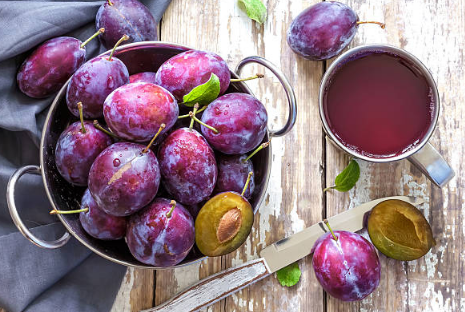Prune juice, made from dried plums (Prunus domestica L.), is known for its potential digestive and heart health benefits. Many people rely on prune juice as a natural remedy for constipation, but that’s not all it’s good for. It also packs a nutritional punch—rich in vitamins, minerals, and antioxidants that can help support your overall wellness.
1. Helps Prevent and Relieve Constipation
Most of the research on prune juice focuses on its natural laxative properties. It’s a go-to home remedy for easing constipation—and for good reason.
Here’s what gives prune juice its unique power:
-
Fiber: Adds bulk to your stool, helping it move more easily through the digestive tract
-
Polyphenols: May support gut bacteria and digestive health
-
Sorbitol: A natural sugar alcohol that draws water into the intestines, softening stool
In one study, adults with chronic constipation drank just 54 grams of prune juice or a placebo daily for eight weeks. Those who drank prune juice had fewer hard or lumpy stools—and no negative side effects.

2. May Help Lower Blood Pressure
High blood pressure is a major risk factor for heart disease and stroke. Adding prune juice to a balanced diet might help bring those numbers down.
Research shows potassium-rich fruits like prunes can help lower blood pressure. Potassium helps counteract some of the harmful effects of sodium on your blood pressure levels.
3. Could Lower Cholesterol
Dried prunes have been shown to help reduce cholesterol levels—and prune juice may offer similar benefits. A review of nine clinical trials found that prune supplements helped lower total cholesterol and “bad” LDL cholesterol.
4. Packed with Antioxidants
Drinking prune juice may offer some of the same antioxidant benefits as eating whole prunes. Prunes are loaded with phenolic compounds, which have powerful antioxidant effects.
Antioxidants help fight damage caused by free radicals—unstable atoms that contribute to oxidative stress and increase your risk of disease.
5. Full of Essential Vitamins and Minerals
Prune juice is a great source of several key nutrients, including:
-
Iron: Essential for making hemoglobin, the protein that carries oxygen from your lungs to the rest of your body
-
Potassium: An electrolyte that helps regulate heart, nerve, and muscle function
-
Vitamin C: Supports wound healing, immune function, and the health of your skin, bones, and connective tissue
-
Vitamin K: Found in small amounts in prune juice, it plays a role in bone health and blood clotting
Are There Any Risks?
Prune juice is generally considered safe, but there are a few things to watch for.
-
Allergies: Some people may be allergic to prunes or prune juice
-
Digestive upset: Because of its laxative effects, drinking too much can lead to bloating or diarrhea. Start with small amounts and increase gradually to avoid discomfort
-
Acrylamide: Prune juice contains trace amounts of acrylamide, a chemical that forms when carbohydrates are heated. It’s considered a possible human carcinogen—but the amounts in prune juice are typically very low
How to Add Prune Juice to Your Diet
One cup of 100% prune juice counts as one serving of fruit. How much fruit you need each day depends on your age, gender, size, activity level, and overall health—but most healthy adults should aim for two servings of fruit per day.
Here are a few easy ways to enjoy prune juice:
-
Blend it into smoothies or stir it into brewed tea
-
Add it to sweet or savory sauces for extra depth
-
Mix it with sparkling water, ginger, and fresh herbs to create a refreshing mocktail